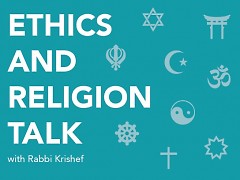Jacob L.H. asked the Ethics and Religion Talk panel, “Where is the line between tolerance and complicity? I try very hard to be respectful of people’s views that are different than mine, but I feel there is definitely a point where I could easily become complicit in some form of oppression or other such problematic behavior.”
Last week, we presented three answers. Here are three additional responses to the question.
Father Michael Nasser, who writes from an Eastern Christian perspective and is Pastor of St. Nicholas Orthodox Christian Church, responds:
“Respect for the views of others is something that should never waiver. In the freedom God gives to all of us, none of us should remove another’s freedom to choose their own views. But this does not mean each of us needs to be active in support or encouragement of all views, either when honest disagreements occur but especially when those views can be harmful to others. This series of articles is hopefully a good demonstration that we can all respectfully hold our own views in light of our disagreement with others. But that does not obligate us to endorse the views of others, which I frequently cannot do, nor do I expect others to endorse mine. We can benefit from the growth of understanding that comes with respectful sharing of differing views, and when we choose, we may change our views as others’ views convince us that such change brings us closer to the fullness of truth.”
The Reverend Colleen Squires, minister at All Souls Community Church of West Michigan, a Unitarian Universalist Congregation, responds:
“Most of us are taught to be polite and to be respectful of other people’s beliefs. I think in the age of social media where we are encouraged to comment or give our opinion more than ever before we are being challenged to understand new norms. It is also true our conversations are no longer as private as they once were; the audience is larger and therefore we are hearing more opinions than we are used to digesting. Because of this we are learning new parameters for what constitutes as being polite and respectful.
“In addressing this question I suggest using the litmus test of two of the Rev. Dr. Martin Luther King’s famous quotes, ‘In the End, we will remember not the words of our enemies, but the silence of our friends,’ and ‘Our lives begin to end the day we become silent about things that matter.’ I think it is very possible to be polite and respectful and also call out behavior that is oppressive or harmful to others. Allowing bigotry to go unchecked is not being polite or respectful to those being oppressed. Being silent is not remaining neutral it is siding with the oppressor. I encourage you to speak up for things that matter.”
R. Scot Miller, who writes from an Anabaptist and Quaker Christian perspective, responds:
“If there is one thing that religious texts teach us, and reality affirms, is that there is never a pure place to stand. Just ask Jacob and Leah and Rebecca, Boaz, David, Jonah, and any woman in the Bible, such as the daughters of Lot or Tamar. This is why faith is best practice in communities, and American individualism focuses so much on grace at the expense of voluntary sacrifice. The rejection of privilege related to overcoming complicity with injustice or radical corporate sin is much more difficult without the support and accountability of a community that agrees to voluntarily sacrifice privilege or benefits of privilege together. Americans generally see election as a blessing and ask for God to bless us more. If we listened more, we might be asking God to share blessings with everyone who blesses God and seek to be the best persons of faith we can be, rather than being the most productive and patriotic American. Democracy subsumes religious claims of justice into national identity, and identity that very often conflicts with the justice delineated in religious texts.”
My response:
I see the struggle lying between the Biblical command to “rebuke your friend” (Leviticus 19:17) and a general sense of not wanting to be that person who is always criticizing. Jewish legal literature recognizes the problem, and restricts the obligation to give reproach to cases in which the other person is likely to be open in hearing the rebuke and responding positively to it. Thus, I share reproach sparingly. More to the point of the question, I would argue that I am only complicit in another’s behavior if I had the power to change the behavior. Thus, I can easily tolerate different political opinions without feeling that I am complicit because the chances of changing someone’s political opinion are vanishingly small. Nonetheless, I have a separate and ongoing obligation to speak out for racial and economic justice, to speak out for equality and non-discrimination, and in general to make my views known on important social issues.
This column answers questions of Ethics and Religion by submitting them to a multi-faith panel of spiritual leaders in the Grand Rapids area. We’d love to hear about the ordinary ethical questions that come up on the course of your day as well as any questions of religion that you’ve wondered about. Tell us how you resolved an ethical dilemma and see how members of the Ethics and Religion Talk panel would have handled the same situation. Please send your questions to [email protected].
The Rapidian, a program of the 501(c)3 nonprofit Community Media Center, relies on the community’s support to help cover the cost of training reporters and publishing content.
We need your help.
If each of our readers and content creators who values this community platform help support its creation and maintenance, The Rapidian can continue to educate and facilitate a conversation around issues for years to come.
Please support The Rapidian and make a contribution today.
